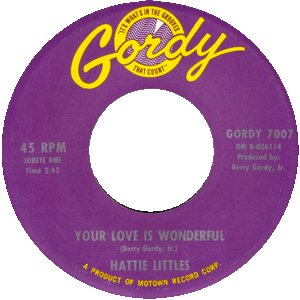Tags
 Gordy G 7007 (A), September 1962
Gordy G 7007 (A), September 1962
b/w Here You Come
(Written by Berry Gordy)
 After Hattie Littles’ fine first Motown single, the smoky blues Back In My Arms, had had its release cancelled for reasons unknown, company president Berry Gordy Jr. was the catalyst for righting a wrong. Gordy wrote and produced both sides of this “follow-up”, Hattie’s official début, the A-side dating from a session he’d had with Littles earlier in the year and the B-side being cut after the previous record’s cancellation.
After Hattie Littles’ fine first Motown single, the smoky blues Back In My Arms, had had its release cancelled for reasons unknown, company president Berry Gordy Jr. was the catalyst for righting a wrong. Gordy wrote and produced both sides of this “follow-up”, Hattie’s official début, the A-side dating from a session he’d had with Littles earlier in the year and the B-side being cut after the previous record’s cancellation.
In every interview I’ve ever read, Hattie has taken her somewhat shabby treatment at Motown (she had no further single releases after this one, with a much-belated follow-up being cancelled in 1965) with exceedingly good grace, so it’s unlikely she was kicking up too much of a fuss, but one likes to think Gordy sprang into action because he knew such a talent couldn’t go to waste.
And she was a talent, there’s no doubt about it. Your Love Is Wonderful – not to be confused with the Four Tops’ 1968 single of the same title – gives her a fine opportunity to show her stuff. Noticeably toned-down from Back In My Arms, less raw and more commercial (though not really that commercial), this sounds like something Gordy might have offered to Mable John or even Mary Wells, and Hattie gives a remarkable vocal performance, big, throaty and full of verve and soul.
The lyrics are an uncomplicated, direct exclamation of joyful devotion – I can see it in your eyes every time you smile, it makes your love so wonderful, Hattie declares at one point – but there’s a reason she sounds so convincing. According to the liner notes to The Complete Motown Singles: Volume 2, Gordy had written this song especially for Hattie, who was in love with a married man (she kept his identity a secret her whole life, and Gordy himself has never spilled the beans); the man in question was apparently there in the studio during the recording, giving a subtext to Hattie’s performance far beyond mere acting.
Her voice actually threatens to overwhelm the material in places, the band’s performance in the first verse a little restrained for the size of Hattie’s character, but things swing around with an excellent largely-instrumental break at 1:08, a superb trumpet solo putting the smiles back on the band’s faces. Another short verse, and then the song’s second surprising break – a key change at 1:54, Hattie now partnered with some smooth male backing vocals.
From there on in, it’s up to Hattie to bring the song home, this final section perhaps closest to the slinky blues of her cancelled would-be début, Littles cutting loose with variations on the title combined with what sound like ad-libbed interjections, giving another demonstration of the powerful throatiness in her voice.
I don’t like categorising records by genre, but insofar as such labels can be helpful, while this has the fingerprints of the blues all over it, it’s not really blues in itself, it’s at the outer edges of blues-flavoured R&B balladry – but it’s still not really all that commercial, however much Berry Gordy might have wanted to pitch the record to a wider audience. Hattie, a proper dyed-in-the-wool blues fan, just didn’t seem interested in becoming a crossover pop star. The liner notes to The Complete Motown Singles: Volume 2 note that she spent her live shows paying tribute to Fifties blues and jazz greats, rather than following the Mary Wells path towards building a popular following and storming the charts; this seems to have been her choice, and good on her for following through with it. Sadly, despite apparently cutting reams of material for the company, this was her one and only Motown release.
VERDICT
MOTOWN JUNKIES VERDICT
(I’ve had MY say, now it’s your turn. Agree? Disagree? Leave a comment, or click the thumbs at the bottom there. Dissent is encouraged!)
You’re reading Motown Junkies, an attempt to review every Motown A- and B-side ever released. Click on the “previous” and “next” buttons below to go back and forth through the catalogue, or visit the Master Index for a full list of reviews so far.
(Or maybe you’re only interested in Hattie Littles? Click for more.)
 |
 |
| Singin’ Sammy Ward “Part Time Love” |
Hattie Littles “Here You Come” |


Dave Godin’s review in the Tamla Motown Appreciation Society’s magazine, Hitsville USA #2, is worth repeating:
“It is one of those tracks that need to be heard a few times before you start to get its method. Slow, ponderous and tortured, Miss Littles is simply perfect in her emotional and forceful reading of the lyrics that have the aura of spoken day-dreams and half-formed thoughts. Pure gold!”.
He awarded it the maximum five stars out of five, compared to four out of five for “Here You Come”.
LikeLike
The word “method” above should read “message”.
LikeLiked by 1 person
I’ll be damned and damned and damned. I just heard this song for the first time today, on YouTube and have been going nuts on it. What the articulate and astute reviewer writes I fully agree with, plus, the deep soul spirit of Dave Godin further vindicates my obsession. I am beyond stoked…just truly elated that others have rallied on behalf of this spectacular recording.
LikeLike